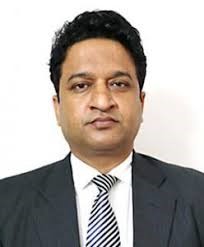
Dr. Pankaj Jha (07.07.1973-20.05.2024) was a Professor & Associate Dean (Research) and Founding Director, Centre for Security Studies (CSS), at the Jindal School of International Affairs (JSIA). Dr. Jha was one of India’s finest brains in the field of national security. He was one of the handful of people in our country with extensive knowledge and practical experience in the domains of military, intelligence, warfare, insurgency, terrorism and counter-terrorism, and Asian geopolitics. He authored several books, journal articles, briefs and memos that influenced policymakers, thinkers and students across the world. Prior to joining JGU, he made a distinct name for himself in think-tanks and government. From 2005 to 2011, he was Associate Fellow at the Manohar Parrikar Institute for Defence Studies and Analyses (IDSA). From 2012 to 2013, he worked as Deputy Director in the National Security Council Secretariat (2012-2013) of the Prime Minister’s Office (PMO), and helped formulate and implement key ideas to strengthen India’s defensive and offensive capabilities.
From 2013 to 2016, Dr. Jha worked at the Indian Council of World Affairs (ICWA) and served as Director of Research there, spearheading important publications and spurring high quality output from a large team of scholars on foreign policy themes. His ability to inspire and motivate young thinkers to generate consistent and relevant publications were hallmarks during his ICWA tenure. Ambassador Rajiv Bhatia, who was Director General of ICWA, and who oversaw Dr. Jha at that time sent the following words of condolences upon hearing of his passing:
“Was privileged to know him well at Sapru House. Pankaj was a sincere scholar, always expanding and sharing his knowledge and insights. He formed the core of Fellows who brought much glory to ICWA. He was a leader as well as an excellent team player. He was a devoted family man. Above all, he was a fine human being. He leaves a void. RIP, dear friend.”
At JSIA, Dr. Jha singlehandedly edited and managed the Jindal Journal of International Affairs and ensured its timely and uninterrupted publication as per schedule for several years. He also served on the School Doctoral Committee and oversaw admissions and administration of the PhD students in JSIA. He personally supervised (and was still supervising) several doctoral dissertations and was the go-to person for any and all matters concerning doctoral studies in the School. Since inception, Dr. Jha was a senior mentor and adviser to younger faculty members to help them improve their research and writing skills and to get them to publish in Scopus-indexed journals. There was a steady and continuous improvement in JSIA’s scholarly journal output thanks to Dr. Jha’s indefatigable willingness to make the School’s reputation his own reputation.
Dr. Jha was a great patriot who believed in India’s destiny to become a leading power in the world. His classes were extremely popular with students because he infused learning with a core nationalistic fervour and a hardnosed understanding of power politics. He would always say, “I am a realist and that is how the world works”. Having been in the military and intelligence fields, he also had a realistic understanding of the limitations and risks of the use of force. His views, captured in classroom teaching and in writings, were always measured and balanced and they reflected a practitioner-scholar’s wisdom and sense of restraint when it came to statecraft.
It was supremely ironic or maybe poetic that Dr. Jha breathed his last in Vietnam. He saw the strategic potential for closer partnership between India and Vietnam a lot sooner than most Indian analysts and thinkers. He had close connections with the Vietnam Academy of Social Sciences, the military and Communist Party leadership in Vietnam and was engaged in intense dialogue and policy coordination missions with them to enhance India’s position and influence in the Indo-Pacific region. Tributes from Vietnam and across Asia have came in large numbers when he passed. Many expressed the view that he was “India’s informal ambassador for geopolitical coordination” and that he helped build strategic friendships at the Track 2 level for India.
Professor Jha conceived and developed the Centre for Security Studies (CSS) at JSIA, which produced numerous monographs and briefs. His speciality was to co-author books and shorter works with students of JSIA. The experience of joint research with a senior professor helped make careers for many JSIA students. His Letters of Recommendation and personal networks in think-tanks and research organisations landed so many internships and full-time positions for students. As news of his death came, tributes and memories of how “he made my life” have flowed in from JSIA alumni from all over the world.
For JSIA, Dr. Jha’s loss is an irreplaceable one. He was the first one to raise his hand and take on any institutional responsibility. He put the School and University above self and kept giving until the very last. We commit to uphold the values that he stood for and to strive for excellence in pursuit of national interests. The India that he dreamt of can only be built with his kind of spirit.